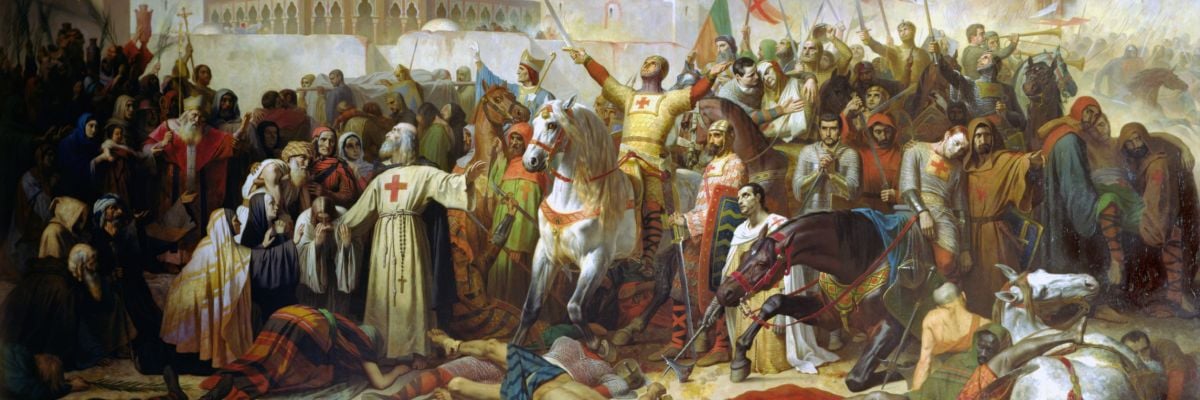
This post is the second in a series about the most prevalent modern myths about the Crusades and how to refute them.
Some people find distasteful the idea that the pope exhorted and spiritually incentivized Catholic warriors to fight in the Crusades. They say the Crusades highlight the hypocrisy of Christians, who, on the one hand, profess to follow Jesus, who willingly accepted his Passion and death, and on the other, participated in and supported an armed expedition to the Holy Land. This criticism gained popular favor through the writings of the 20th-century historian Steven Runciman.
Perhaps more than any other scholar, Runciman shaped popular understanding of the Crusades, through his three volume History of the Crusades, published from 1951-54. His well-written and engaging style was highly readable, but erroneously presented the Crusaders as simple barbarians bent on the destruction of a peaceful and sophisticated Islamic culture. His view that the Crusades were “great barbarian invasions” and a “long act of intolerance… which is a sin against the Holy Ghost” solidified the myth that the Crusades were unjust wars of Christian aggression—a myth many Catholics swallow to this day.
Were the Crusades unjust? To answer that question, first we must understand that the Church has never taught that all violence is evil or sinful. Divine Revelation affords the use of violence in certain cases and for just reasons. The Old Testament is replete with examples of legitimate warfare sanctioned by God undertaken by the Jewish people.[1] These examples clearly illustrate that God commanded and allowed the use of violence for a holy purpose.
St. Augustine of Hippo (354-430), in his work City of God, consolidated Jewish and Greco-Roman traditions into a Christian understanding of legitimate warfare, or “just-war doctrine.” Augustine taught that violence could be undertaken for legitimate reasons, including past or present aggression, proclamation by a legitimate authority, and restoration of order and property. A review of the historical record proves the Crusades met these criteria.
The Crusades were born from the violent aggression of Islam, which had conquered ancient Christian territory in the Holy Land and North Africa and established a large foothold in Europe within a century of Muhammad’s death in the early seventh century.
Additional Christian territory was stolen by Islamic conquerors in the late eleventh century when the Seljuk Turks, a nomadic peoples from the Asian steppe who converted to Sunni Islam, invaded Anatolia (modern-day Turkey), a very important province of the Byzantine Empire. Emperor Romanus IV Diogenes (r. 1068-1071) gathered a mixed force of imperial troops and mercenaries in an attempt to stop the Seljuk advance, but they were defeated at the Battle of Manzikert in 1071. Their victory allowed the Seljuks to consolidate their power in Anatolia, establishing it as the Sultanate of Rum with its capital in the ancient Christian city of Nicaea, site of the first ecumenical council in 325 and within striking distance of Constantinople.
And so, in the first place, the Crusades were launched to recover these conquered Christian territories and return them to the patrimony of Christ, which is one of the criteria for a legitimate exercise of violence.
Another justification for war is self-defense and/or defense of innocents threatened with violence. The Crusades were also a response to the severe persecution of indigenous Christians living in the occupied territories, whose lives were severely restricted and who suffered constant pressure to convert to Islam. As an example, in the early eleventh century, Christians living in the Fatimid caliphate were subject to persecution during the reign of al-Hakim, who ordered them to wear identifying black turbans and a large cross in public. He also ordered the destruction of the Church of the Holy Sepulchre in Jerusalem, originally built by Constantine and St. Helena in the fourth century.[2]
Christian pilgrims were also subjected to harassment and violence, which demanded a defensive response from Christendom. The Seljuks, who were known for their brutality, threatened pilgrims to the holy sites in Palestine. As an example, a group of 12,000 German pilgrims led by Bishop Günther of Bamberg in 1065 was massacred by the Seljuks on Good Friday, only two days’ march from Jerusalem.
The invasion of Christian territory, Muslim persecution of native Christians and pilgrims, plus the threat posed to the Christian Byzantine Empire, were all legitimate reasons to engage in defensive warfare and, and Bl. Pope Urban II cited them as justification for the First Crusade. And so in 1095, at the Council of Clermont, the pope preached an armed pilgrimage to recover the lost Christian territory of the East and specifically the Holy City of Jerusalem.
Urban viewed the Crusade as a pilgrimage, the aim of which was not to conquer but to visit the place of pilgrimage and then return home. Later popes maintained the understanding of the Crusades as just, defensive wars with the central goal of the recovery of ancient Christian territory. Heroic men and women of faith, rooted in love of Christ and neighbor, undertook the Crusades as acts of self-defense and recovery of stolen property. This is the proper understanding of these important events in Church history.
[1] See Ex. 15; 32:25 – 28; 1 Sam. 15:3 and 2 Macc. 15:27-28.
[2] The church was rebuilt in 1048 and then renovated and greatly expanded by the Crusaders after the liberation of Jerusalem in 1099.



